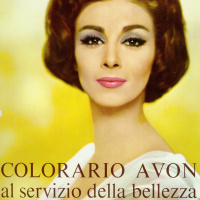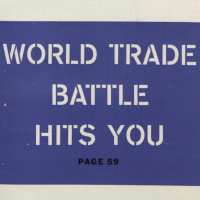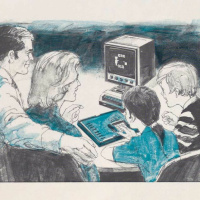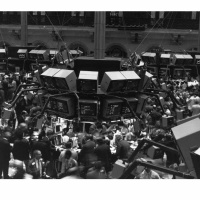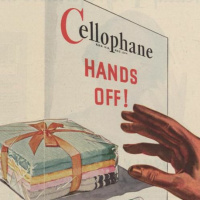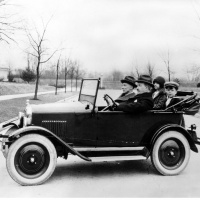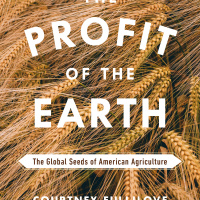Sinopsis
Podcast by Hagley Museum and Library
Episodios
-
Beauty Sold Everywhere: The Early Globalization of Avon with Emanuela Scarpellini
03/09/2019 Duración: 23minForget Hollywood superstars. In the 1960s, women around the world wanted a sense of normality when they consumed cosmetics. As the Avon company attempted to win consumers for its mass-produced goods in Latin America and Europe, it adapted its marketing materials to reflect the segmentation of local and changing global ideals of beauty. In this episode of Stories from the Stacks, historian Emanuela Scarpellini, professor at the University of Milan, discusses how Avon planned its expansion overseas from the United States, and adapted to the context of a global marketplace. Monochromatic American ideals of beauty did not necessarily match those of other cultures, yet American goods enjoyed global cachet that added to their perceived value. Easing the tension between these push and pull factors were the Avon ladies, the sales agents that the company relied upon to retail its products, and to communicate with and cultivate consumers. Using Hagley Library collections, including Avon Products, Inc., and the Ern
-
People Would Fake Being Everything: American Impostors with Clifton Hood
20/08/2019 Duración: 25minIn the wide-open American economy, some people fake it ‘til they make it. Historically, American impostors realized the promise of social mobility. Identifying freely with different ethnic, racial, class, gender, or professional groups allowed some Americans to challenge social norms, and to reinvent themselves in an environment of rapid and disorienting change. In this episode of Stories from the Stacks, historian Clifton Hood, professor at Hobart & William Smith Colleges, discusses the macro-history of the American impostor as a social phenomenon. Hood situates his project in the context of his life’s work, suggesting that it may be a way of accessing subaltern perspectives on social hierarchies by locating and interrogating their attempted transgressions of its strictures. Using Hagley Library collections, including Empire Steel & Iron, Reading Company, Pennsylvania Railroad, Penn Virginia Corporation, and Brandywine Oral Histories, Hood discovered that business and government elites tried a variety of
-
The Diplomatic Value of Trade: America's Commercial Cold War with Ryan Haddad
06/08/2019 Duración: 25minTrade wars are nothing new, and the weapons used to fight them sometimes backfire. During the Cold War, the United States took a carrot-and-stick approach to managing foreign relations through trade. The results were decidedly mixed. In this episode of Stories from the Stacks, Ryan Haddad, PhD candidate at the University of Maryland, discusses the use of trade controls by the United States government to pursue foreign policy goals during the Cold War. Using Hagley Library collections, including the records of the National Foreign Trade Council and the National Association of Manufacturers, Haddad discovered how Cold War policies designed to promote free trade in the West, and to isolate the Communist bloc, forced American firms to navigate uncertain diplomatic conditions while trying to maintain market share and profitability. Haddad received an Exploratory Grant from the library’s Center for the History of Business, Technology, & Society to support his use of Hagley Library collections. More informatio
-
It's Okay to Have Fun with Computers: Video Game Culture with Elizabeth Badger
23/07/2019 Duración: 24minIs it okay to have fun with computers? Joseph Weisbecker, an electrical engineer from the twentieth century, gives an unequivocal yes! During his long career, Weisbecker made it his mission to promote the use of computers for human purposes beyond business and military applications. For him, there was no shame in video games, and he wanted the world to agree. On this episode of Stories from the Stacks, Elizabeth Badger, PhD candidate at the University of Minnesota – Twin Cities, discusses the early history of video game culture, focusing on the effects of the commodification of games. Badger suggests that gaming culture initially focused on collective effort and community ethos, and that a turning point in the 1980s lead to the re-conception of video games as consumer commodities controlled by corporate interests. Badger situates her project in the context of her own experience with gaming and video game culture, noting the widespread prejudice against video games, and the sexism within gaming culture. Us
-
Building for Infinite Participation: High-Speed Trading in New York & Chicago with Aaron Shkuda
09/07/2019 Duración: 25minIn 1968, the New York Stock Exchange drowned in a sea of paperwork, which forced it to close to trading for one day every week. Something had to be done to allow the finite space of the trading floor to serve the potentially infinite growth in trade volume. The automation of securities trading, the replacement of open outcry pits and paperwork with electronic infrastructure, gained momentum as exchanges competed to be bigger, faster, and more secure than rivals. In this episode of Stories from the Stacks, urban historian Aaron Shkuda, project manager of the Princeton-Mellon Initiative in Architecture, Urbanism, & the Humanities, discusses his research into the ways securities exchanges in New York and Chicago met the spatial challenges of their mid-twentieth century growth. Shkuda focuses on the relationship between exchange, back office functions, and the urban fabric in which they are embedded, which drew numerous stakeholders into the discussion of market expansion and automation. Using Hagley Library
-
There's a Huge Corporate Asset Here: Brands & Trademark Law with Oren Bracha
25/06/2019 Duración: 25minPrint and sell posters with the Coke-a-Cola logo on them and prepare to get sued. For corporations today, brands are valued property to be aggressively defended from unauthorized use. This was not always the case. The proprietary attitude taken by companies toward their brands developed in the context of a growing consumer economy, and under the tutelage of lawyers. In this episode of Stories from the Stacks, legal scholar Oren Bracha, professor at the University of Texas at Austin, discusses his research into the legal history of branding and trademarks. Bracha observes that the function of brands in influencing consumer behavior had been recognized by marketers by the turn of the twentieth century, and that the function of brands as corporate property developed subsequently as a result of the intersection of business practice with the legal profession. Using Hagley Library collections, including the Seagram and DuPont company records, Bracha discovered how the proprietary attitude toward brands translate
-
Nobody Rationalizes Billy: The Early Automotive Industry with Bernie Carlson
11/06/2019 Duración: 24minEverybody knows Henry Ford, then there’s the tycoon you’ve never heard of, Billy Durant. The motive force behind the early success of Buick and the founding of Chevrolet and General Motors, William C. Durant developed business practices that transformed the automobile industry. Durant was a businessman of marked tenacity and impatient of restraint, and he used these qualities to amass a fortune and to fend off would-be interlopers in his arena of corporate power. In this episode of Stories from the Stacks, historian Bernie Carlson, professor at the University of Virginia, discusses his research into the role played by William Durant in the early automobile industry. Carlson suggests that the prominence of Henry Ford and Louis Chevrolet in the historiography of automobiles obscures the diversity of business practice that flourished in the early decades of the industry. Among Durant’s key innovations was the development of the holding company as a corporate form with control over subsidiary firms for manufact
-
THE TVS OF TOMORROW: RCA AND THE INVENTION OF THE FLAT SCREEN TELEVISION with Benjamin Gross
06/02/2019 Duración: 57minTHE TVS OF TOMORROW: RCA AND THE INVENTION OF THE FLAT SCREEN TELEVISION with Benjamin Gross by Hagley Museum and Library
-
An Explosive Time: 1918, A Year in an Explosives Factory
05/09/2018 Duración: 26min1918—it was an explosive time. The nation was at war. Political movements for workers and women's suffrage were gathering steam. The world was on the brink of change. What better place to explore an explosive moment in time than at an explosives factory? In our first episode of this four-part series, we dive into the conflicts and disruptions of the year 1918—from U.S. entry into World War I to the influenza epidemic—and learn how they influenced the lives of the men and women who were making the munitions for the U.S. and its allies at DuPont's Brandywine Works, and the families and communities that depended on them. See more photos, interviews and scripts: https://www.hagley.org/explosive-time
-
Blank Space: The Design Evolution of the Modern Magazine
17/08/2018 Duración: 25minAt the turn of the 20th century, the modern magazine was taking shape, and printers, publishers, illustrators, and advertisers were playing around with new styles and techniques for capturing their readers’ attention. In this episode, Jennifer Greenhill (associate professor of art history at the University of Southern California and author of "Playing it Straight: Art and Humor in the Gilded Age") explores how artists incorporated insights from psychology and advertising into their designs and page layouts. Using blank space, typography, and color, they helped establish a modern aesthetic of magazine illustration and design that was intimately connected to the world of advertising.
-
Lessons from the Early Beginnings of Black Empowerment
02/08/2018 Duración: 34minIn the late 1960s, the civil rights struggle had given way to a more militant black power movement. The Opportunities Industrialization Center (OIC) offered a business-friendly alternative: black empowerment through job training and economic advancement. In this episode, Jessica Levy (postdoctoral research associate at Princeton University's Department of African American Studies) talks with us about how OIC offered vocational and corporate education programs for African Americans in partnership with American companies like Gulf Oil and General Motors. Following their success in America, OIC and American businesses exported these methods to apartheid-era South Africa, arguing that the lessons of desegregation in the United States could apply there too.
-
The DuPont Company's Entry into the Dynamite Business Out West
20/07/2018 Duración: 29minSeth Lunine (lecturer in the Geography Department at University of California, Berkeley) explores the history of the high explosives industry in California and DuPont's eventual acquisition of many of these West Coast Companies. Lunine explains that he saw a hole in the historical research and discovered that the high explosives industry began in the west and came east.
-
The Sportswomen Who Picked Up Guns In A Man's Shooting World
06/07/2018 Duración: 26minIn this episode, Mallory Huard (Ph.D. candidate in history and women’s studies at the Pennsylvania State University) introduces us to the women who picked up rod and gun as part of the Progressive Conservation movement, and how they were depicted in images, advertisements, magazines, and newspapers. More info: www.hagley.org/stories
-
The Global Seeds of American Agriculture with Courtney Fullilove
28/06/2018 Duración: 44minIn this author talk, which took place at the Hagley Library on May 10, 2018, Wesleyan history professor Courtney Fullilove explains how Turkey Red Wheat became the predominant variety planted in the U.S. Great Plains in the late 19th century — the breadbasket of the world at the time. She explains how both plant explorers and Mennonite farmers helped transplant this important product, demonstrating that, far from being remote backwaters, the wheat-growing regions of the world have been connected in highly cosmopolitan ways.
-
Escape from New York: How Urban Workers Relaxed in the 19th Century City
22/06/2018 Duración: 29minWhat did urban workers do for fun in the 19th century? With not a lot of money, a grueling work schedule, and only Sundays off, it could be difficult to escape the routines of the city and its toil. In this episode, Marika Plater (Ph.D. candidate in history at Rutgers University) digs deep into the archives to get at how working-class New Yorkers spent their limited free time, and what this reveals about their attitudes toward nature. More info: www.hagley.org/stories
-
How the Emerging Tech World Turned Patents into Weapons
08/06/2018 Duración: 27minGerardo Con Diaz (Assistant Professor of Science and Technology Studies at the University of California, Davis) takes us back in time to when programs were not so intangible, and explains the different strategies that computer firms pursued to turn programs into profitable inventions. More info: www.hagley.org/stories
-
How Japanese Companies Rebranded in the United States after WWII
23/05/2018 Duración: 31minFrom Honda to Nikon, Kawasaki to Nintendo, Japanese brands are ubiquitous in America with a reputation for quality and reliability— but this wasn’t always the case. Around the time of World War II, most Americans were loath to buy Japanese products, not only because of the conflict, but because their goods on American shelves were often shoddy and cheap. How did Japanese companies turn that hostility into hospitality — and why did American consumers change their minds? William Chou is a Ph.D. candidate in history at the Ohio State University.
-
Cabinet of Curiosities: the History of the U.S. Patent Office's Models of Invention
11/05/2018 Duración: 16minBetween 1836 and 1880, the U.S. Patent Office required that anyone applying for a patent submit a scale model along with their application. Reed Gochberg, the first researcher to dive into Hagley’s extensive collection of patent models, tells us about these fascinating objects and her attempts to understand how 19th-century Americans experienced and understood them. ---------------------------------------------------------------------------------------- Reed Gochberg is a lecturer in history and literature at Harvard University.
-
The Birth of Big Brother: Urban Train Stations & State Agents
27/04/2018 Duración: 31minRailroad stations were the transportation hubs of the nineteenth century, nodes in a network connecting people and places across the country. But while they represented mobility, they were also places where travelers could be stopped in their tracks. In this episode, Zachary Nowak (Harvard University) explains how large urban train stations reshaped city life as powerfully as the railroads transformed rural America. Centralized depots called “union stations” became the malls of their era: private buildings that served as public spaces, but where police and railroad officials could apprehend criminals, restrict the movement of suspicious persons, and exert their power.
-
Why Concrete Has Been King from Ancient Rome to Outer Space
12/04/2018 Duración: 21minFrom sidewalks to roads to buildings, concrete surrounds us in our daily lives, but we rarely stop to think about it. In this episode, Vyta Baselice (Ph.D. candidate in American Studies at the George Washington University) talks about her efforts to understand how concrete became the quintessential modern building material, showing up not just in big construction projects, but in everything from coffin vaults to imagined building projects on other planets.

